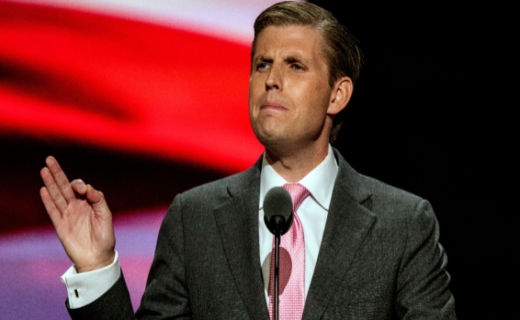Politics
Eric Trump Speaks Out About What FBI Found In His Father’s Safe

Eric Trump, son of former President Donald Trump, has revealed that the FBI agents who showed up at his dad’s Florida estate and searched his house for alleged confidential documents, also searched his safe, but found nothing. The safe was empty. Can you imagine the outrage that would we would be seeing all over the news media if this happened to President Joe Biden or former President Barack Obama? Yikes.
According to a report from the Conservative Brief, Eric stated that the safe was empty and that well over two dozen agents from the bureau were involved in the raid on Mar-a-Lago. He then stated that the agents were searching for documents that were supposed to have gone to the National Archives.
“Nothing was in the safe,” Eric revealed.
“Last week, the special master assigned to review more than 11,000 documents seized from Mar-a-Lago made a ridiculous request that the judge in the case quickly dismissed. He wanted the former president’s attorneys to declare whether all of the more than 11,000 documents were accurate and he wanted them to do it in eight days,” the report said.
That, of course, is a huge task, but the legal team has not seen all of the documents because some of them have been labeled as classified, according to the Western Journal.
“It was a request absurd enough that it got struck down by the same federal judge who appointed the special master in the first place. On Thursday, just one day before the deadline, U.S. District Judge Aileen Cannon ruled that Trump wouldn’t be forced to comply, according to UPI,” the report continued.
“There shall be no separate requirement on Plaintiff at this stage, prior to the review of any of the seized materials,” the judge went on to say. “The Court’s Appointment Order did not contemplate that obligation.”
The directive was issued by senior federal Judge Raymond Dearie, who was appointed to look over the documentation taken in the raid and determine whether or not some of the documents were privileged.
Despite the fact there were over 11,000 documents, Dearie wanted Trump’s legal team to meet a Sept. 30 deadline to identify items that were in the inventory “that the plaintiff asserts were not seized from the premises.”
“This submission shall be the plaintiff’s [Trump’s] final opportunity to raise any factual dispute as to the completeness and accuracy of the Detailed Property Inventory,” he stated.
However, over 100 of the documents were deemed classified, which kept Trump’s team from being able to see them.
“Additionally, Plaintiff currently has no means of accessing the documents bearing classification markings, which would be necessary to complete any such certification by September 30, the currently proposed date of completion,” the former president’s legal team said.
The judge then stated, “[s]hould any additional matters surface during the Special Master’s review process that requires reconsideration of the Inventory or the need to object to its contents, the parties shall make those matters known to the Special Master for appropriate resolution and recommendation to this Court.”
He then went on to say that Trump’s lawyers didn’t have to provide details to execute executive privilege claims as the special master carries out the review of the documents. “He initially asked that the former president log documents ‘in categories more specific than what Cannon’s order appointing the special master had laid out,'” CNN added. “Trump objected to making the executive privilege distinction Dearie proposed. Cannon adopted other aspects of Dearie’s plan for how the documents should be categorized,” it remarked.
Then, in his own filing from September, Judge Dearie stated that he has “determined that the efficient administration of the Special Master’s duties requires the assistance of the Honorable James Orenstein (Ret.), a former United States Magistrate Judge for the Eastern District of New York, who has experience with complex case management, privilege review, warrant procedures, and other matters that may arise in the course of the Special Master’s duties.”
Dearie pointed out that Orenstein has served as “an appointed amicus curia in the Foreign Intelligence Surveillance Court” and “currently holds Top Secret clearance.”
Dearie stated that despite being charged with looking at 11,000 documents that were seized by the FBI from Trump’s house, he does not want to view the classified records.
“Let’s not belittle the fact that we are dealing with at least potentially legitimately classified information. The government has a very strong obligation, as all of us, to see to that information doesn’t get in the wrong hands,” U.S. District Judge Raymond Dearie went on to say during a federal court hearing.
“It’s not just a matter, it seems to me, of being cleared. It is a matter of need to know. And if you need to know, you will know,” Judge Dearie explained. “That’s the way I see it. If I can make my judgments without—I don’t want to see the material—it’s presumably sensitive material. If I can make my recommendation to Judge Cannon, right or wrong, without exposing myself or you to that material, I will do it. On the other hand, if I can’t, we have to take another alternative.”
What really needs to be determined is whether or not the FBI seized material that was not supposed to be included on the list of information they were seeking during the raid. We need to know if the raid by the bureau was an attack launched by progressives in the government to try and take down a political opponent of the president’s because it’s guaranteed, if that’s the case, they won’t stop at the former president.

